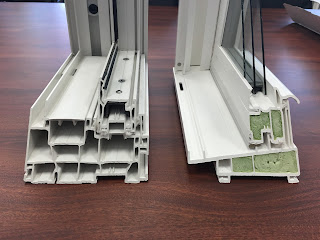No matter what
replacement window you purchase for your home, those windows have a few jobs to do. One of those things all windows must do well is keeping the rain out of your house! All decent windows succeed in keeping your interior dry, but not all windows do it the same way.
When the rain hits the window, whether it be the glass pane, framing, sash rails, etc., there needs to be a way for the rain to leave it. Much like gutters are used for removing water from your roof, the sash systems removes the water from your windows.
The pocket sill is one of the most common window systems. The technology has existed since the beginning of vinyl windows. The concept of the pocket will works like this:
- Rain water hits the window and falls to the sill.
- The water drains into the vinyl chambers (pockets) in the sill.
- The water drains out of the closed pocket sill via weep holes, typically in the front of the window.
The sloped sill window system predates pocket sills. If you have wood windows, chances are you have sloped sills. However, this is NOT a common sill for replacement vinyl windows, because it is more expensive to manufacture.
Here's how the sloped sill works in a vinyl window:
- Rain water hits the window and falls to the sill.
- Water drains out of the weep holes on the bottom of the sloped sill.
As you can see, the sloped sill is a simpler system.
So which is better, the pocket sill or the sloped sill? Well, there's less things that can go wrong with a sloped sill:
- No standing water
- No clogged weep holes
- No bug infestations
Given the option, go with a sloped sill. It's a cleaner look too. Here's a picture of a pocket sill (left) vs. a sloped sill (right):
As I said, if you have an option to pick the sloped sill, you should go with that. And if you're looking for
windows in Cincinnati, make sure to check us out!
Mike
The Window & Door Guy

